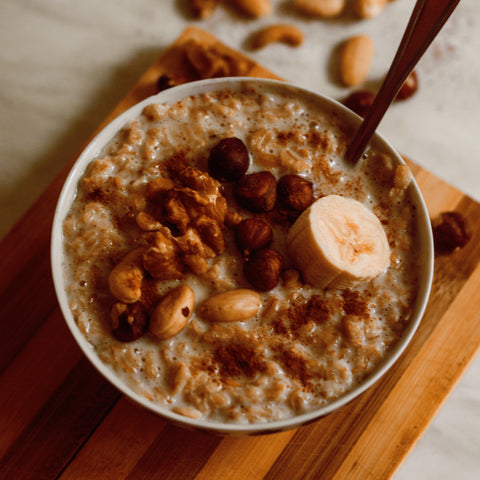PMS IS MANAGAEABLE!!
Mood swings, food cravings, fatigue, irritability, tender breasts… We have all been there!! (well most of us). The exact cause of PMS or Premenstrual Syndrome is not known, but as per the research, many factors pitch in to this undesirable syndrome such as - fluctuating hormones, changes in serotonin levels (chemical messengers that can boost mood) and DIET. A woman’s diet and nutrition intake influence her PMS as several food nutrients help support hormone detoxification, impacts hormone activity and even boosts their production. Hence, altering the diet can be a real game changer when it comes to taking charge of our health.

PMS-FRIENDLY DIET…
"There's evidence that diet is involved in either the development of PMS or contributes to the severity of symptoms," says Elizabeth Bertone-Johnson, ScD, an associate professor of epidemiology.
Even the most determined women give into the PMS hunger-pangs and load up on the foods which one should steer clear from during ‘those days’ leading up to their periods. Most women find on-the-spot solace in such foods but it may end up making things worse, silently. Whether you experience mild PMS symptoms or intense, the right type of foods can help control or ease out the symptoms, boost your energy levels and may make you feel cheerful and healthy all in all.
Below are some of the diet-related suggestions to combat PMS related symptoms –
TURN TO COMPLEX CARBS & PROTEIN

High in fiber and natural sugars, complex carbohydrates are the important nutrients that enter your bloodstream slowly over time, reduce the intake of sugar to improve symptoms such as curbing those unwanted cravings, attentiveness and elevate the irritated mood. Foods like lean protein, whole grains, beans, sweet potatoes, lentils, potatoes are all examples of foods rich in complex carbs. Some of the fruits and vegetables are also good sources.
CUT BACK ON SODIUM
Hormonal changes that happen pre-period lead to water retention and loading up on sodium makes it worse. It's almost impossible to eliminate sodium from your diet but reducing some of it can help lessen period-related bloating, weight gain, breast sensitivity and water retention. Salt is hidden in a lot of unexpected places, so try to cook your own meals as much as you can and avoid eating processed, packaged foods. Also, in lieu of conventional table salt, one can use sea salt or Himalayan pink salt as it doesn’t have the aluminum compounds that tamper with your body’s natural water balance.
DON’T OVERLOAD ON SUGAR
The craving for sugary foods often increases during the premenstrual phase due to shifting levels of the hormones - estrogen and progesterone and these changes may affect a woman's mood and trigger PMS symptoms. Often hiding within heavily processed foods, refined added sugars offer little to no nutrition. Though a little is okay, don’t make it as the main component of your diet.
EASE UP ON ALCOHOL AND CAFFEINE
It’s tempting to have a glass of wine or a hot cup of coffee to feel good but consumption of alcohol and caffeine adds up to the already unstable hormones and fluctuating blood sugar levels. Both these drinks may disrupt your precious sleep and aggravate the symptoms further. Easing up on both alcohol and caffeine help ease breast tenderness and bloating.
STAY WELL-HYDRATED

If there's one thing you want to be more mindful of during this time of the month, it's drinking plenty of water. Substituting water in place of other drinks can increase the energy level and may help ease some of the symptoms. Drinking at least eight glasses of water per day can help relieve symptoms like bloating, muscle cramps, and fatigue. Besides, you can even flavor water with lemon, cucumber, ginger or coriander for additional flavor and health benefits.
EAT NUTRIENT-RICH AND HEALTHY FOODS

Eating nutrient rich foods can actually help you feel better!
OMEGA-3 FATTY ACIDS – These are found in foods such as salmon, walnuts, soyabean and canola oil, chia seeds, tuna etc. can reduce inflammation in the body, and may help tackle the pain.

B VITAMINS – Foods that are high in B vitamins (thiamin, riboflavin, niacin, folate, B12, and B6) and Calcium can help relieve the intensity of cramps.
H2O – Foods with high water content like cucumbers, onions, watermelon, tomatoes etc. are natural diuretics that help with the bloating.
OTHER VITAMINS – Vitamins C, D, and E are anti-inflammatory nutrients also help curb the menstrual pain.
PROTEINS – These are important and if eaten in moderation helps to keep our blood sugar and our moods stable.
MAGNESIUM – It is an important element to include in our diet and can be found in foods such as dark leafy greens or nuts and seeds. A lack of it can trigger or worsen some of the symptoms.
IRON – You need to increase iron intake to replace what you lose each month. Consume foods like lean meats, pomegranate, spinach, apricot, dates, figs, legumes, eggs and other iron-rich foods to ease PMS symptoms.
POTASSIUM – Less potassium intake can cause muscle cramping. Foods like bananas and oranges are a good source of potassium, and may stop your body from retaining water and feeling bloated.
DON’T SKIP MEALS
Eat regular meals without skipping any as this will keep your blood sugar stable through the course of the day and your mood in place. You can even split your meals into six small meals instead of three big meals.

Apart from certain dietary changes, there are some lifestyle changes you can make to improve your symptoms and help bring your hormones back into balance. Indulging in any physical activity such as brisk walk, aerobics, running, bicycling etc. helps raise serotonin levels and manage those unwanted cravings and other PMS symptoms. Sticking to a regular physical regimen also benefits energy and sleep. At least half an hour of exercise will get you going. Additionally, soaking up the sun helps your body produce serotonin which is great for reduced cravings and stable mood. Another important thing is managing stress during this time. Certain breathing exercises, yoga and meditation promotes relaxation and reduce stress.





